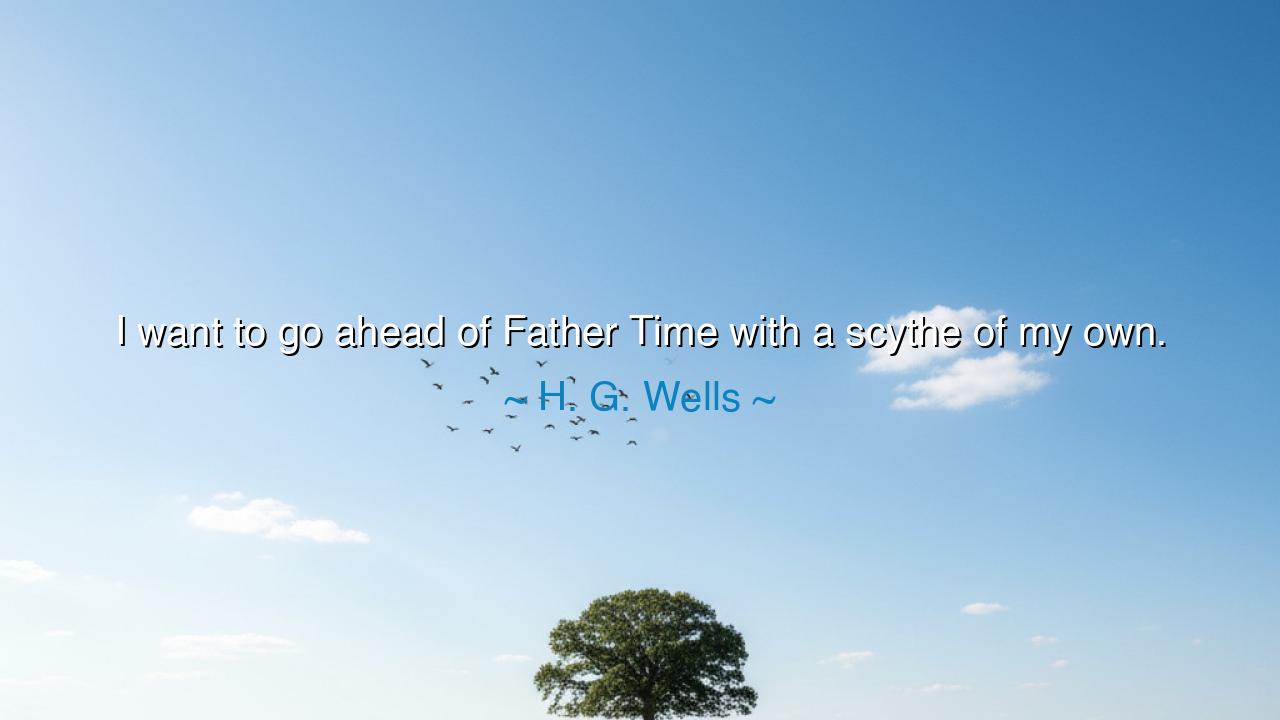
I want to go ahead of Father Time with a scythe of my own.






Hear, O seekers of destiny, the daring words of H. G. Wells: “I want to go ahead of Father Time with a scythe of my own.” In this bold cry is not the quiet submission of a man resigned to fate, but the defiance of one who would meet time as an equal. For Father Time, ever depicted as the reaper with his scythe, harvests all things—youth, strength, nations, empires. Yet Wells, prophet of science and dreamer of the future, longed not merely to endure this reaping, but to wield a scythe of his own, to shape destiny before destiny consumed him.
The origin of this thought lies in Wells’s restless spirit. He was no ordinary writer, but the father of visions: of time machines, of invisible men, of worlds beyond Earth. He lived in an age when science was breaking chains, when men began to fly, when electricity lit the night. In such an age, he could not remain content with bowing before the slow march of time. His words reveal the heart of a man who sought mastery, who desired to strike first, to use invention and imagination to carve a path before the scythe of age and mortality could cut him down.
Consider the tale of Leonardo da Vinci, whose genius reached beyond his century. He too sought to outpace time, filling page after page with sketches of flying machines, weapons, bridges, and wonders that would not be built until long after his bones had turned to dust. Though his hand could not bring all his visions into being, his mind went ahead of Father Time, planting seeds that would bloom in ages to come. Leonardo, like Wells, grasped a scythe of his own—his was the scythe of imagination, cutting into the future before the reaper could silence him.
But this saying is not only about invention; it is about the courage to live with urgency. How many men and women waste their hours, walking timidly behind time, waiting for life to decide for them? Wells exhorts us to run forward, to reap what we can before time takes its due. To wield our own scythe is to act with purpose, to create boldly, to dare greatly. The reaper cannot be defeated, but he can be challenged, and in that challenge lies the greatness of human endeavor.
Yet, let us not mistake this fire for arrogance. Wells’s words also carry humility, for he admits that Father Time is inexorable. His desire to go ahead with his own scythe is not to escape death, but to leave a harvest of his own making before death arrives. It is the cry of one who knows that life is brief, and thus must be filled with deeds that endure beyond the grave. The scythe he speaks of is not a weapon against time, but a tool to carve meaning within its fleeting span.
The lesson, then, is clear: do not wait idly for time to reap your days. Take up your own scythe—whether it be the scythe of art, of labor, of invention, or of love—and cut a path of meaning through the field of your life. Each of us has but a season, and the harvest must be made before the winter comes. The coward hides from time and is consumed; the wise face it, and in facing it, leave behind fruits for others to gather.
Practical counsel follows. Do not delay your dreams, for delay is time’s greatest ally. Begin your work now, even in small steps. Record your thoughts, craft your art, build your vision, nurture your relationships. Let no day pass without a stroke of your own scythe. And when the reaper comes, let him find not an empty field, but one filled with golden sheaves—proof that you lived not as a shadow, but as a creator.
Thus, hold fast to Wells’s bold defiance: “I want to go ahead of Father Time with a scythe of my own.” Let it remind you that though you cannot defeat the reaper, you can match his stride. You can harvest your own destiny, and leave behind a legacy that even time must honor. For though the scythe of time takes all, the works of the brave endure, carried forward in the memory of generations yet unborn.






AAdministratorAdministrator
Welcome, honored guests. Please leave a comment, we will respond soon